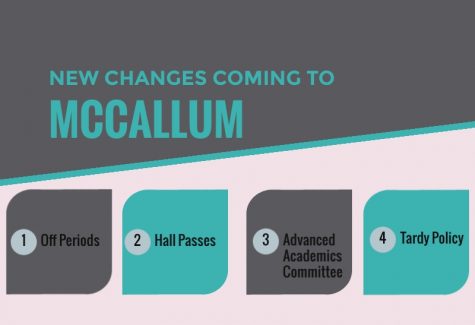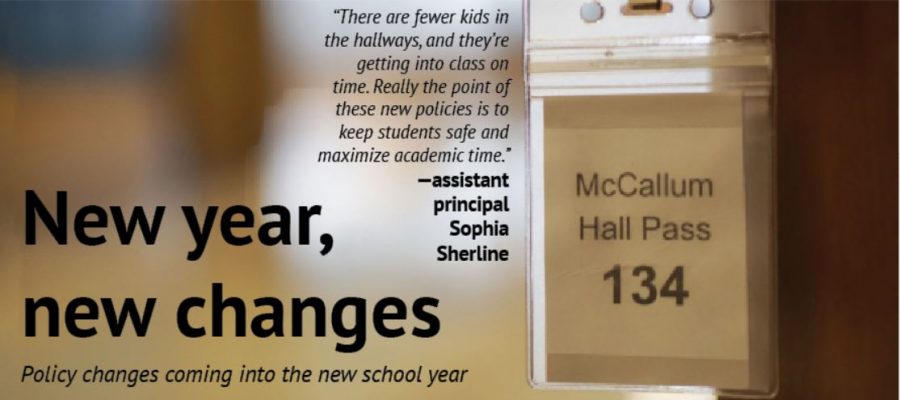Targeting tardies, silencing cell phones
Innovations include academics committee, flexible instruction time, restrictions on free periods
Hall passes on lanyards are part of the new policy changes at McCallum this year. Given to all teachers, students are expected to leave class with the pass in hand. Photo illustration by Dave Winter.
October 22, 2019
Walking into McCallum on Aug. 20, no one really knew what to expect. Although the freshman class was new to the dynamic of high school altogether, even the upperclassmen were walking in blind when it came to the new policies put in place by interim principal Brandi Hosack and AISD. Many people recalled the email sent to their parents on Aug. 15 listing these changes which would be implemented during the 2019-20 school year, and nobody really knew how they would affect the day-to-day life at MAC. The Mac administration told The Shield, however, that no policy change was put in place without reason.
“One of the main policy changes targets tardies,” assistant principal Sophia Sherline said. “The new policy states that each student is allowed two free tardies each week, and after a third violation, lunch detention will be given. If given lunch detention, students will be pulled out of class during sixth period and taken to the ISS room where only lunch and homework will be allowed.”

The new tardy policy was created in response to teachers who voiced frustration about how their classrooms are continually disrupted by late students. But tardy students aren’t the only distraction the new policies aim to address.
“[With] the new phone policy, students are only allowed to use their cell phones for educational purposes, still giving teachers autonomy in how they utilize the technology,” Sherline said.
The new cell phone directive is a campus-wide policy put in place to help teachers who are unsure how to deal with constant distraction from students’ cell phones.
In order for this policy and its resulting disciplinary consequence to be invoked, however, students must be in class. That’s where the new hall pass policy comes into place. In an attempt to lessen the number of students in the halls without reason during instructional time, Hosack has prioritized the use of hall passes. Each student in the hallway is to have a hall pass from their classroom to show that they’re approved to be in the halls by their teacher and to help administration distinguish between these students and those skipping their classes.
“There are fewer kids in the hallways, and they’re getting into class on time,” Sherline said. “Really the point of these new policies is to keep students safe and maximize academic time.”
Starting this year, McCallum’s administration has introduced a new Advanced Academics Committee. The group is comprised of a variety of faculty including teachers of AP, OnRamps, ACC and regular classes, plus counselors—Nikki Nitardy, Shelley Goldstein and Cristela Garcia—and assistant principal Tamara Stone. According to Stone, the main goal of the initiative is to help students get the most out of their education.
“The group is looking at our advanced courses,” she said. “We’re looking at how we recruit students for the classes and retain students as well. We want to make sure that all students are aware and knowledgeable of these opportunities.”
With the introduction of the Advanced Academics Committee, new policies have been put in place as well. For example, there is a new system in place in the event that a student would like to drop an honors class.
“We want the student’s teacher, counselor, and parents to agree on dropping the student down a level,” Stone said. “We don’t want for a student to decide that it’s too much without the student trying to get help. We want our students to be the best that they can be, get the most college credit coming out of high school, and [we] want to be able to guide our students to higher level classes with critical thinking that will help them in the future.”
To combat miscommunication and gaps between students and teachers, added academic support has been put in place as well. FIT, or flexible instruction time, has been implemented into the schedule at McCallum in an attempt to build tutoring time into the school day. Students have the chance to sign up for their teacher’s sessions through the AISD portal, whether it be for tutoring, club meetings, or for mindfulness practices. FIT is designed to help students with their workload and give them more opportunities to make relationships with their teachers.
Even the seniors are getting a change for the last year of their high school career, the implementation of free periods. In order to have a free period added to one’s schedule, the student must pass all STAAR or EOC exams, clear all NCs, not be enrolled in any Delta or twilight classes, and be considered college ready by the SAT, ACT, or TSI. A complete college application or military letter must be submitted to Nitardy as well. In the office, students can find the forms needed to apply for an off period. Signatures are needed to verify each completed application, signifying that a student is officially college or military ready.
“Unfortunately, in the past many seniors were given off periods when they were missing necessary credits to graduate,” Stone said. “The change is really a check that’s been put in place so that off-period time is used wisely and so that our students are able to graduate on time.”
The changes taking place at McCallum this year were designed to help students by enriching their instructional time and to give the administration a clear outline on how to enforce said changes.
“I think with any new changes comes anxiety,” Stone said. “The point of these new policies are about safety and maximizing academic time. [We’re] making sure students are in their classes and not missing out from the teacher, maximizing instructional time.”




